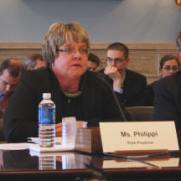US pork producers make Farm Bill wish-list

The National Pork Producers Council (NPPC) has indicated to lawmakers what the country’s pork producers want and don’t want in the next Farm Bill.
There are several bills pending in Congress that could adversely affect pork producers’ ability to market their hogs, including a ban on meat packers using contract growers and a requirement that packers buy at least 25% of their pigs on the so-called spot market.
“Punitive actions against packers do not necessarily benefit pork producers in the long run unless the packers are clearly in the wrong,” NPPC past President Joy Philippi, a pork producer from Bruning, Neb., told the House Agriculture Subcommittee on Livestock, Dairy and Poultry.
“We have seen no evidence of this, and Congress must proceed with caution, weighing the costs and benefits of such important public-policy decisions.”
Prosperous years
NPPC pointed out that while the structures of the US pork industry and pork and hog markets have changed over the past 10 years, pork producers have enjoyed “unparalleled prosperity” over the past three years, recording 35 consecutive months of profitability through December 2006 with an average profit of $22.17 per head over that period, according to data from Iowa State University.
It also said that significant taxpayer dollars have been invested in researching competition in the livestock markets but that USDA and the livestock industry have not had time to digest and consider any findings.
NPPC urged lawmakers concerned about competition and concentration in the livestock industry to look at transactions rather structures to determine if markets are working.
Farm Bill wish-list
Addressing pork industry issues it expects will be included in the 2007 Farm Bill, NPPC asked the Senate Agriculture Committee to:
- End the 51-cent per gallon ethanol production subsidy (tax credit) and stop the 54-cent tariff on imported ethanol to help ease corn supply pressures that are growing because of the rapid rise in ethanol production.
- Dismantle regulatory hurdles to allow pork producers to incorporate conservation planning into their operations.
- Increase EQIP funding allocations to pork producers so that they can raise the level of their environmental performance and address critical conservation and environmental needs on their operations.
- Oppose a ban on non-ambulatory or fatigued hogs from entering the food supply.
- Oppose a ban on the use in livestock of certain antibiotics.
- Oppose a ban on the use of sow stalls on farms that produce food animals that are purchased by the federal government.
- Oppose efforts to eliminate or mandate livestock marketing or pricing mechanisms.
- Support increases in funding for the Market Access Program and the Foreign Market Development Program to boost pork exports.
- Pass trade agreements negotiated with Peru, Colombia, Panama, and South Korea and extend Trade Promotion Authority.
- Continue funding for government research related to the pork industry, including research on swine genetics, animal vaccines and animal productivity.
More info: NPPC











